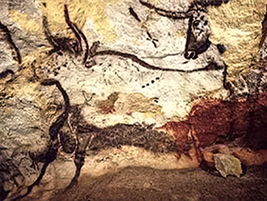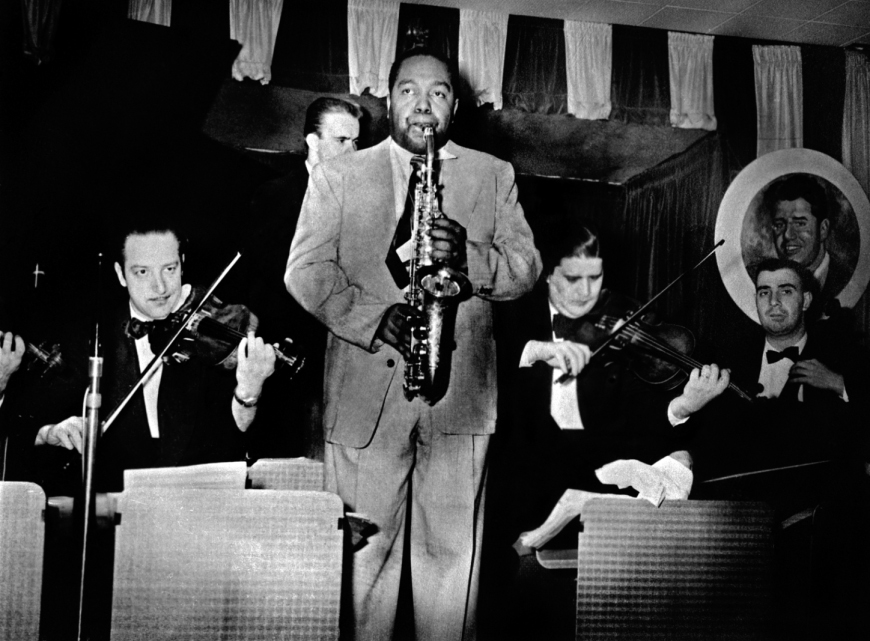Why.
Posted August 8th, 2011 by Sean WilliamsHere’s what I’d like to say.
About forty thousand years ago, some dude was drawing with charcoal on a wall, and his friend came up behind him.
His friend said, “What’s that?” and the dude said, “Oh! Uh… This is me and you and the girls and the other guys, and we’ve got a fire going.”
His friend said, “Holy shit, that’s awesome! How did you do that?” and the dude said, “I’m not really… It’s just the end of a burnt stick, if you rub it on the wall…” and the friend said, “No, man, I mean – how did you figure out how to make this look *exactly* like the way we look, or… not even that, it just – It looks like the way we FEEL when we’re all sitting around a fire…” and the dude said, “I don’t know. Seriously. I just kinda… saw it. In my mind.”
They didn’t say anything for a minute and the friend said, “Well, it’s awesome.” And the dude said, “All right, I’m gonna finish it later, we’ve gotta go hunt,” and the friend said, “NO WAY! Man, I’ll get you some bison jerky, just finish the painting. Seriously, finish it, everyone’s gonna freak out.”
And that was that. Here we are fifty thousand years later, and art is unchanged. Artists are unchanged and jerky is really not that much different. But what has changed is commerce, because now there are people lined up with machines and lawyers and ideas about copywright and a thousand other things, all designed to provide the artist with the means to get jerky. Because jerky is delicious, and is perfect for my low-carb diet.
So, where are we? The world of the professional artist is so enervating, with so many different disciplines at play on every front. A writer can’t simply write, she has to create protections for herself, she has to write for different audiences and to different specifications depending on what kind of money she intends to make. A screenplay is very different from a TV spec script, a half hour three camera comedy is totally different from a half hour one camera comedy, and there are advanced degrees available to people who want help charting those waters. An actor can’t simply act, he has to develop the relationships necessary to get invited to auditions, he has to read every casting director and director and display his technical prowess to create a sense of artistic symmetry, and he has to have several different headshots, updated every six months or every haircut.
It’s insane.
It was always this way, right? I don’t know. I really don’t. I’m sure there are times it’s easier and times it’s harder.
But the independent theater world is populated by people who, for one reason or another, just aren’t doing most of that crap. For some of us, we just can’t, but for many of us, we’re just not going to. And, because of that, we’re in a completely insulated world. We’ve given up on the profit motive, and we know we’ve lost the battle for the hearts and minds of an industry that only once in a blue moon spends its time watching something we’ve done – and then it’s usually not with good intention. We fly so utterly under the radar that we have had to create our own publications, our own journalists, just to have a conversation about our art. And most of us are buying our jerky with found money, or money earned elsewhere.
My GOD, it’s fantastic. It’s so fantastic.
Let me tell you who we ARE, just so we’re clear. We run shows for three weeks, and we perform in venues with fewer than 99 seats. Almost all of our work is written by playwrights without a national reputation, and almost all are directed and acted by the same, and the productions are financed hand-to-mouth. When you see one of our shows, as you sit, you will be able, most likely, to move the chair you’re sitting in. You will be able to hear the costume changes off stage. You will feel the lights, hanging on the grid eight feet over your head. The producer, most likely, gave you your program, and told you that it doubled as your ticket. And you paid less than $20.
It’s $20, not fifty cents, so in that way, we’re not the underground nightclubs in Harlem in 1938. But in every other way, what we’re doing now mirrors the jazz movement of the 20s and 30s. Our venues are small and shitty, and usually sweaty and packed. And they are far away from the 40s and Broadway. Our artists lead shifty but thrifty lives, hanging on to day jobs no matter how late they were up the night before, sleeping on couches when shit falls apart, and burning with the desire to tell our stories. And it is The Depression right now, nobody has any money, and everyone is looking for something to take their minds off the feeling of despair and separation. And even if that thing is desperately sad and alone – you can be in the room with less-than-99-other people and know that you’re sharing this moment with these people. And the sense of improv is there, even when you’re not in an improv theater, the sense of history is there, even with an immature and grating play done by recent college grads, and the sense of “expanding the instrument’s range” is there, even if it’s a theater or a body and not Louis Armstrong or Dizzy Gillespie’s trumpet.
Why wouldn’t I be here? If I can, and I can, then why would I be anywhere else? And I don’t mean New York, this is happening in Austin, in Chicago, in Atlanta – anywhere you pay less than $20 for a ticket and you sit in a folding chair. Just like jazz in Kansas City and New Orleans and Chicago – this isn’t a fad, it isn’t a place. It’s global, it’s a new Chautauqua, it’s happening like the ocean’s waters rise. We are standing tall as popular entertainment, but we’ve left behind all delusions of financial security. We are moving forward because of the scratching on the wall, knowing that we have no hope that the jerky will one day be rib-eyes.
We also have the same spirit of competition and improvisation that was here in the 20s and 30s, and the same motion from one discipline to another. Actors become playwrights, playwrights become directors, and everyone’s a producer. We feed off each other, we watch what everyone else is doing and avoid the mistakes and drool over the successes. We want to steal, and to be stolen from. We want to be as good as the best, we want the crappy to catch up, and we want the extraordinary to throw away their desire for a businessman’s success. We want, the entire culture is starving, we’re all leaning forward trying to see what everyone else is doing, trying to drink deeply from every well.
And yeah, half the time we spit it back out, more than half probably. I mean, how many sax players were getting beat down by Charlie Parker. THE BAD IS WHAT IS SO GOOD. It’s earnest, it’s stupid, it’s sloppy or it’s too polished. But it isn’t bad because it thinks it’s gonna get you. It’s not bad because of shitty product placement, or stunt casting, or some delusion that this little story is gonna make anyone rich or famous. It’s bad the way that an awkward kid tells a joke, or an Ivy League college plays basketball, or the way a four year old paints the bathroom. It’s bad, but when you watch it, in the indy theater world, you ALMOST ALWAYS get the sense that they could make it better. Or that you could. And you do – and they do – the next piece is always better. And if it isn’t, they usually leave – and often for great soap opera or sitcom success.
And maybe the worst way that we’re jazz and this is the depression is this – we’re inviting you, but you have to go, you have to listen and you have to care. We always want you there, we’re never gonna tell you that you don’t get an opinion, we’re never gonna tell you that you don’t get to watch – I mean, Jesus, we’re here to tell you that you should make your own play, for chrissakes. It costs 50 million dollars to make a movie, it costs 5 million to make a TV show, it costs 500 thousand to make an off Broadway play, and we’re saying here that if you can scrape together about 5 grand and an email address with a facebook group, then you’ve got your own MOVEMENT. You have your own company with your own identity, you’re in the conversation, and you get to tell everyone how full of shit they are, or how beautiful they are, it’s up to you.
I was a working actor for fifteen years until I retired six years ago. I’ve acted almost as much since I quit, since I put all my resources into being a member of this community. My headshot doesn’t have gray hair, my acting resume still has tap-dancing leads on it, and I’m a salt-n-pepper stay-at-home dad in his forties. But since I’ve quit, I’ve gotten to tell stories, I’ve been a part of countless nights of insane one-acts, I’ve sat and talked shit on the roof outside the Battle Ranch and across from The Brick, I’ve watched my friends crawl around the small hot storysheds that cover downtown and the outer boroughs, and I can’t count the number of times I sat holding my breathe, the number of times I realized I was dizzy in my chair, simply because I didn’t want to breathe.
I look at my friends, I look at their companies, and when one actor moves to direct someone else’s piece, I’m never surprised. When the venue manager becomes a playwright, it never shocks me. When the playwright steps in and acts, in someone else’s play, with someone else directing, and kills it, I know why. Because we all think we can, because we all have the chance to fail, because the entire thing is built above a trampoline and you can fall as low as you want, you *will be bounced back up*. And so we are all free to follow our heart’s content.
It is not all good. It is more bad than good. More misunderstanding than statement. More bad jokes than funny ones, more melodrama than storylines. But Charlie Parker discovered one night that he could play any note- any note at all, and resolve it back to the melody line, or to a counter-melody line, or to an inversion of the accompaniment chord, and he did it in a shitty club. Also in that club, probably, playing with him were Thelonius Monk and Dizzy Gillespie, Kenny Clarke and Charlie Christian. I say “probably” because there are no recordings of this time. It was a shitty little club, and there were no recordings, and this kid was strung out on heroin and working for nine dollars a week washing dishes (so he could hear Art Tatum play), but if you wanted to, you could have heard the entire future of music shift in a single moment. But there are no recordings. You had to care, and you had to be there, you had to GO.
That’s why I go. That’s why Indy Theater. I believe it’s happening, it’s happening here and now, and I’ll be damned if I miss it.


This is beautiful.